| Listing 1 - 9 of 9 |
Sort by
|
Book
ISBN: 9789655391367 Year: 2016 Publisher: Tel Aviv Tel Aviv Museum of Art
Abstract | Keywords | Export | Availability | Bookmark
 Loading...
Loading...Choose an application
- Reference Manager
- EndNote
- RefWorks (Direct export to RefWorks)
Art --- visual poetry --- artists' films --- Dada --- Lettrist --- Abulafia, Abraham
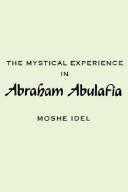
ISBN: 0585087229 9780585087221 088706552X 9780887065521 0887065538 9780887065538 9781438407456 1438407459 9781438407456 Year: 1988
Abstract | Keywords | Export | Availability | Bookmark
 Loading...
Loading...Choose an application
- Reference Manager
- EndNote
- RefWorks (Direct export to RefWorks)
This book represents the first wide-scale presentation of a major Jewish mystic, the founder of the ecstatic Kabbalah. It includes a description of the techniques employed by his master, including the role of music. There is a discussion of the characteristics of his mystical experience and the erotic imagery by which it was expressed. Based on all the extant manuscript material of Abulafia, this book opens the way to a new understanding of Jewish mysticism. It points to the importance of the ecstatic Kabbalah for the later developments in mystical Judaism.
Cabala --- Ecstasy (Judaism) --- Kabbale --- Extase --- History. --- Histoire --- Judaïsme --- Abulafia, Abraham ben Samuel, --- Ecstasy (Judaism). --- Religion
Book
ISBN: 0911437983 Year: 2002 Publisher: Lancaster, Calif. : Labyrinthos,
Abstract | Keywords | Export | Availability | Bookmark
 Loading...
Loading...Choose an application
- Reference Manager
- EndNote
- RefWorks (Direct export to RefWorks)
Cabala --- Ecstasy (Judaism) --- Kabbale --- Extase --- History. --- Histoire --- Judaïsme --- Abulafia, Abraham ben Samuel,
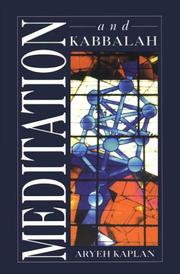
ISBN: 1568213816 Year: 1985 Publisher: York Beach, Maine : Samuel Weiser,
Abstract | Keywords | Export | Availability | Bookmark
 Loading...
Loading...Choose an application
- Reference Manager
- EndNote
- RefWorks (Direct export to RefWorks)
Cabala. --- Hasidism. --- Judaism --- Meditation --- Mysticism --- Doctrines. --- Judaism. --- Judaism. --- Abulafia, Abraham ben Samuel, --- Gikatalia, Joseph. --- Luria, Isaac ben Solomon,
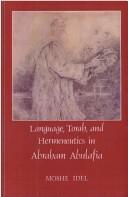
ISBN: 0887068316 0887068324 Year: 1989 Publisher: Albany State University of New York Press
Abstract | Keywords | Export | Availability | Bookmark
 Loading...
Loading...Choose an application
- Reference Manager
- EndNote
- RefWorks (Direct export to RefWorks)
Hebrew language --- Cabala --- Kabbale --- Philosophy --- History --- Histoire --- Abulafia, Abraham ben Samuel, --- Jewish language --- Jews --- Semitic languages, Northwest --- Languages --- Aboulafia, Abraham, --- Abraham ben Samuel Abu-lʹ-afyah, --- Abu-lʹ-afyah, Abraham ben Samuel, --- Abulafia, Abraham, --- Abulʼafya, Avraham, --- Abulʼafya, Avraham ben Shemuʼel, --- Abulʼafyah, Avraham, --- Avraham, --- אבולעפיא, אברהם --- אבולעפיא, אברהם בן שמואל --- אבולעפיא, אברהם בן שמואל, --- אבולעפיה, אברהם --- אבולעפיה, אברהם, --- אבולעפיה, אברהם בן שמואל --- אבולעפיה, אברהם בן שמואל, --- אבולעפיה, אברהם. כהן, רפאל --- Philosophy.
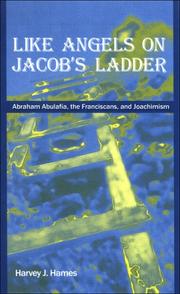
ISBN: 0791479188 143563294X 9781435632943 9780791479186 079147271X 9780791472712 9780791479186 Year: 2007 Publisher: Albany : State University of New York Press,
Abstract | Keywords | Export | Availability | Bookmark
 Loading...
Loading...Choose an application
- Reference Manager
- EndNote
- RefWorks (Direct export to RefWorks)
This book explores the career of Abraham Abulafia (ca. 1240–1291), self-proclaimed Messiah and founder of the school of ecstatic Kabbalah. Active in southern Italy and Sicily where Franciscans had adopted the apocalyptic teachings of Joachim of Fiore, Abulafia believed the end of days was approaching and saw himself as chosen by God to reveal the Divine truth. He appropriated Joachite ideas, fusing them with his own revelations, to create an apocalyptic and messianic scenario that he was certain would attract his Jewish contemporaries and hoped would also convince Christians. From his focus on the centrality of the Tetragrammaton (the four letter ineffable Divine name) to the date of the expected redemption in 1290 and the coming together of Jews and Gentiles in the inclusiveness of the new age, Abulafia's engagement with the apocalyptic teachings of some of his Franciscan contemporaries enriched his own worldview. Though his messianic claims were a result of his revelatory experiences and hermeneutical reading of the Torah, they were, to no small extent, dependent on his historical circumstances and acculturation.
History --- Judaism --- Salvation. --- Ecstasy (Judaism) --- Cabala --- Brotherhood Week --- Salvation --- Religion --- Mysticism --- Religious aspects --- Christianity --- History of doctrines --- Relations --- Christianity. --- History. --- Joachim, --- Abulafia, Abraham ben Samuel, --- Fiore, Gioacchino da, --- Fiore, Joachim von, --- Gioacchino, --- Gioachino, --- Joachimus, --- Pseudo-Joachim, --- Aboulafia, Abraham, --- Abraham ben Samuel Abu-lʹ-afyah, --- Abu-lʹ-afyah, Abraham ben Samuel, --- Abulafia, Abraham, --- Abulʼafya, Avraham, --- Abulʼafya, Avraham ben Shemuʼel, --- Abulʼafyah, Avraham, --- Avraham, --- אבולעפיא, אברהם --- אבולעפיא, אברהם בן שמואל --- אבולעפיא, אברהם בן שמואל, --- אבולעפיה, אברהם --- אבולעפיה, אברהם, --- אבולעפיה, אברהם בן שמואל --- אבולעפיה, אברהם בן שמואל, --- אבולעפיה, אברהם. כהן, רפאל --- Kabbale --- Extase --- Salut --- Judaïsme --- Histoire --- Christianisme --- Aspect religieux --- Histoire des doctrines
Book
ISBN: 1283120631 9786613120632 9004194479 9789004194472 9789004194465 9004194460 Year: 2011 Publisher: Leiden Boston Brill
Abstract | Keywords | Export | Availability | Bookmark
 Loading...
Loading...Choose an application
- Reference Manager
- EndNote
- RefWorks (Direct export to RefWorks)
Abraham Abulafia (1240 – c. 1291) founded an enormously influential branch of Jewish mysticism, referred to as the prophetic or ecstatic kabbalah. This book, from several perspectives, explores the impact of Christianity upon Abulafia. His copious writings evince an intense fascination with Christian themes, yet Abulafia’s frequent diatribes against Jesus and Christianity reveal him to be deeply conflicted in his relationship to his southern European religious neighbors. This book undertakes a careful study of Abulafia’s writings, suggesting that the recognition of an inner dynamic of attraction and revulsion toward the forbidden other provides a crucial key to understanding Abulafia’s mystical hermeneutic and his meditative practice. It also demonstrates that Abulafia's uneasy relationship to Christianity shaped the very core of his mystical doctrine.
Cabala. --- Christianity and other religions --- Judaism --- Brotherhood Week --- Cabbala --- Jews --- Kábala --- Kabalah --- Kabbala --- Kabbalah --- Qabalah --- Jewish literature --- Magic --- Mysticism --- Judaism. --- Relations --- Christianity. --- Cabala --- Abulafia, Abraham ben Samuel, --- Aboulafia, Abraham, --- Abraham ben Samuel Abu-lʹ-afyah, --- Abu-lʹ-afyah, Abraham ben Samuel, --- Abulafia, Abraham, --- Abulʼafya, Avraham, --- Abulʼafya, Avraham ben Shemuʼel, --- Abulʼafyah, Avraham, --- Avraham, --- אבולעפיא, אברהם --- אבולעפיא, אברהם בן שמואל --- אבולעפיא, אברהם בן שמואל, --- אבולעפיה, אברהם --- אבולעפיה, אברהם, --- אבולעפיה, אברהם בן שמואל --- אבולעפיה, אברהם בן שמואל, --- אבולעפיה, אברהם. כהן, רפאל --- Religion. --- Cabala and Christianity. --- Kabbale --- Kabbale et christianisme --- Judaïsme --- Christianisme --- History --- Christianity --- Histoire
Book
ISBN: 1283101912 9786613101914 0300155875 9780300155877 9780300126266 0300126263 9781283101912 6613101915 Year: 2011 Publisher: New Haven
Abstract | Keywords | Export | Availability | Bookmark
 Loading...
Loading...Choose an application
- Reference Manager
- EndNote
- RefWorks (Direct export to RefWorks)
This sweeping survey of the history of Kabbalah in Italy represents a major contribution from one of the world's foremost Kabbalah scholars. The first to focus attention on a specific center of Kabbalah, Moshe Idel charts the ways that Kabbalistic thought and literature developed in Italy and how its unique geographical situation facilitated the arrival of both Spanish and Byzantine Kabbalah.Idel analyzes the work of three major Kabbalists-Abraham Abulafia, Menahem Recanati, and Yohanan Alemanno-who represent diverse schools of thought: the ecstatic, the theosophical-theurgical, and the astromagical. Directing special attention to the interactions and tensions among these forms of Jewish Kabbalah and the nascent Christian Kabbalah, Idel brings to light the rich history of Kabbalah in Italy and the powerful influence of this important center on the emergence of Christian Kabbalah and European occultism in general.
Cabala --- Mysticism --- Cabbala --- Jews --- Kábala --- Kabalah --- Kabbala --- Kabbalah --- Qabalah --- Jewish literature --- Magic --- History. --- Judaism --- Abulafia, Abraham ben Samuel, --- Recanati, Menahem ben Benjamin, --- Menaḥem, --- Reḳanaṭi, Menaḥem, --- רקאנטי, מנחם --- רקנאטי, מנחם בן בנימן, --- רקנאטי, מנחם, --- רקנטי, מנחם --- רקנטי, מנחם בן בנימין, --- ריקאנאטי, מנחם, --- ריקאנתי, מנחם --- ריקאנטי, מנחם בן בנימין, --- מנחם רקנט --- מנחם, --- Aboulafia, Abraham, --- Abraham ben Samuel Abu-lʹ-afyah, --- Abu-lʹ-afyah, Abraham ben Samuel, --- Abulafia, Abraham, --- Abulʼafya, Avraham, --- Abulʼafya, Avraham ben Shemuʼel, --- Abulʼafyah, Avraham, --- Avraham, --- אבולעפיא, אברהם --- אבולעפיא, אברהם בן שמואל --- אבולעפיא, אברהם בן שמואל, --- אבולעפיה, אברהם --- אבולעפיה, אברהם, --- אבולעפיה, אברהם בן שמואל --- אבולעפיה, אברהם בן שמואל, --- אבולעפיה, אברהם. כהן, רפאל --- Recanati, Menahem ben Benjamin --- Reḳanaṭi, Menaḥem
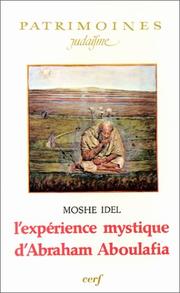
ISBN: 220403021X 2204030252 9782204030212 9782204030250 Year: 1989 Publisher: Paris Cerf
Abstract | Keywords | Export | Availability | Bookmark
 Loading...
Loading...Choose an application
- Reference Manager
- EndNote
- RefWorks (Direct export to RefWorks)
Death --- Jews --- Judaism --- Mourning customs, Jewish --- Hevra kaddisha --- Diseases --- Mort --- Maladies --- Religious aspects --- Social life and customs --- History --- Aspect religieux --- Judaïsme --- Cabala --- Ecstasy (Judaism) --- Kabbale --- Extase --- Histoire --- Abulafia, Abraham ben Samuel, --- Ashkenazes --- Judaisme --- Histoire. --- 296*516 --- 296*72 --- 296 <437 PRAHA> --- Joodse liturgische gebruiken en symbolen --- Joodse sekten en stromingen in de nabijbelse tijd: Karaïten--bv. --- Judaïsme. Jodendom--Tsjechoslowakije--PRAHA --- 296*41 --- -Hevra kaddisha --- -Jews --- -Judaism --- -Jewish mourning customs --- Mourning (Jewish law) --- Mourning customs --- Religions --- Semites --- Hebrews --- Israelites --- Jewish people --- Jewry --- Judaic people --- Judaists --- Ethnology --- Religious adherents --- Burial societies, Jewish --- Chevrah kaddisha --- Ḥevra ḳadisha --- Ḥevrah ḳadishah --- Jewish funeral rites and ceremonies --- Dying --- End of life --- Life --- Terminal care --- Terminally ill --- Thanatology --- Kabbala --- Religion --- Philosophy --- 296*72 Joodse sekten en stromingen in de nabijbelse tijd: Karaïten--bv. --- 296*516 Joodse liturgische gebruiken en symbolen --- 296*41 Kabbala --- Jewish mourning customs. --- Ḥevra kaddisha --- Judaïsme --- Judaism. --- Joodse sekten en stromingen in de nabijbelse tijd: Karaïten--bv --- Mort - Aspect religieux - Judaisme --- Ashkenazes - République tcheque - Prague - Histoire. --- History.
| Listing 1 - 9 of 9 |
Sort by
|

 Search
Search Feedback
Feedback About UniCat
About UniCat  Help
Help News
News